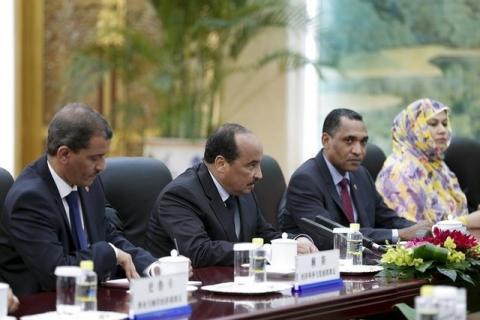Advertisement
Mauritanian leader, seen eyeing 3rd term, says only voters can change law
NOUAKCHOTT (Reuters) - Mauritanian President Mohamed Ould Abdel Aziz has said any change to the Saharan nation's constitution must go to a referendum, after opposition leaders reacted angrily to a plea by his justice minister that he be allowed to run for a third term.
Abdel Aziz made the declaration late on Thursday at the opening of an "inclusive national dialogue" at which delegates from the government, opposition and civil society are to discuss possible changes to the constitution.
"The proposals and recommendations that require constitutional amendments will be submitted to popular plebiscite via a referendum," said Abdel Aziz, an important Western ally in the fight against al Qaeda-linked Islamists in the Sahara.
"Participants in this forum are to be driven uniquely by the interest of the nation, far from any other considerations."
Abdel Aziz, who first came to power in a coup in 2008, won a second five-year term with 82 percent of the vote in 2014. The constitution bars him from seeking another term.
But in March Justice Minister Brahim Ould Daddah suggested lifting the term limit in the Islamic republic, which produces oil and iron ore.
"In order that he can complete construction projects that he has already started, you must ask President Mohamed Ould Abdel Aziz to seek a third or fourth term," he said.
Abdel Aziz was quoted by the state news agency in June as saying that it was "pure speculation" to say he was seeking a third term because he had "never said that I wanted to change the constitution to put myself forward."
The opposition nonetheless suspects that this is the focus of the newly opened national dialogue.
"This is not the time to touch the constitution," Jemil Mansour, head of the Islamist party Tawassoul, which is boycotting the dialogue, told Reuters.
Scrapping term limits would enable Abdel Aziz to tread a path that has been well worn by African leaders of more than a dozen countries. Many of their attempts were successful, including in Uganda, Cameroon, Equatorial Guinea, and more recently Rwanda and Congo Republic.
It also risks igniting instability, as in Burundi, where President Pierre Nkurunziza's disputed re-election last year has brought the country to the brink of civil war, or Burkina Faso, where protesters ousted president Blaise Compaore in 2014.
Other proposed constitutional changes include lifting an age limit on the presidency and the creation of a vice-presidency.
(Writing by Tim Cocks; Editing by Mark Trevelyan)



















Add new comment